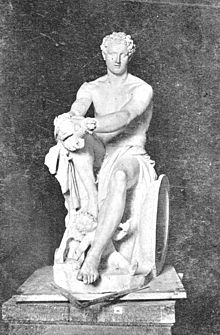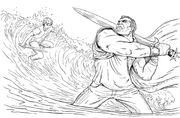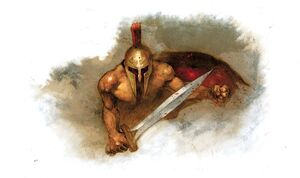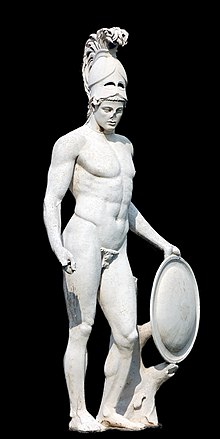ARES THE ONE



Ares
Jump to navigation Jump to search This article is about the ancient Greek god. For other uses, see Ares (disambiguation). Not to be confused with Aries (astrology). AresAbodeSymbolsPersonal informationParentsSiblingsConsortChildrenRoman equivalentNorse equivalentHinduism equivalent
Ancient Greek religion
Ares (/ˈɛəriːz/; Ancient Greek: Ἄρης, Áres [árɛːs]) is the Greek god of war. He is one of the Twelve Olympians, and the son of Zeus and Hera.[1] In Greek literature, he often represents the physical or violent and untamed aspect of war and is the personification of sheer brutality, in contrast to his sister, the armored Athena, whose functions as a goddess of intelligence include military strategy and generalship.[2]
The Greeks were ambivalent toward Ares: although he embodied the physical valor necessary for success in war, he was a dangerous force, "overwhelming, insatiable in battle, destructive, and man-slaughtering."[3] His sons Phobos (Fear) and Deimos (Terror) and his lover, or sister, Enyo (Discord) accompanied him on his war chariot.[4] In the Iliad, his father Zeus tells him that he is the god most hateful to him.[5] An association with Ares endows places and objects with a savage, dangerous, or militarized quality.[6] His value as a war god is placed in doubt: during the Trojan War, Ares was on the losing side, while Athena, often depicted in Greek art as holding Nike (Victory) in her hand, favoured the triumphant Greeks.[3]
Ares plays a relatively limited role in Greek mythology as represented in literary narratives, though his numerous love affairs and abundant offspring are often alluded to.[7] When Ares does appear in myths, he typically faces humiliation.[8] He is well known as the lover of Aphrodite, the goddess of love, who was married to Hephaestus, god of craftsmanship.[9] The most famous story related to Ares and Aphrodite shows them exposed to ridicule through the wronged husband's device.[10]
The counterpart of Ares among the Roman gods is Mars,[11] who as a father of the Roman people was given a more important and dignified place in ancient Roman religion as a guardian deity. During the Hellenization of Latin literature, the myths of Ares were reinterpreted by Roman writers under the name of Mars. Greek writers under Roman rule also recorded cult practices and beliefs pertaining to Mars under the name of Ares. Thus in the classical tradition of later Western art and literature, the mythology of the two figures later became virtually indistinguishable.
The etymology of the name Ares is traditionally connected with the Greek word ἀρή (arē), the Ionic form of the Doric ἀρά (ara), "bane, ruin, curse, imprecation".[12] There may also be a connection with the Roman god of war, Mars, via hypothetical Proto-Indo-European *M̥rēs;[citation needed] compare Ancient Greek μάρναμαι (marnamai), "I fight, I battle".[13] Walter Burkert notes that "Ares is apparently an ancient abstract noun meaning throng of battle, war."[14] R. S. P. Beekes has suggested a Pre-Greek origin of the name.[15]
The earliest attested form of the name is the Mycenaean Greek 𐀀𐀩, a-re, written in the Linear B syllabic script.[16][17][18]
The adjectival epithet, Areios, was frequently appended to the names of other gods when they took on a warrior aspect or became involved in warfare: Zeus Areios, Athena Areia, even Aphrodite Areia. In the Iliad, the word ares is used as a common noun synonymous with "battle."[3]
Inscriptions as early as Mycenaean times, and continuing into the Classical period, attest to Enyalios as another name for the god of war.[n 1]
Character, origins, and worship

Vatican, Rome, Italy. Statue of Ares, Scopas's influence. Brooklyn Museum Archives, Goodyear Archival Collection
Ares was one of the Twelve Olympians in the archaic tradition represented by the Iliad and Odyssey. Zeus expresses a recurring Greek revulsion toward the god when Ares returns wounded and complaining from the battlefield at Troy:
Then looking at him darkly Zeus who gathers the clouds spoke to him:
"Do not sit beside me and whine, you double-faced liar.
To me you are the most hateful of all gods who hold Olympus.
Forever quarrelling is dear to your heart, wars and battles.
...
And yet I will not long endure to see you in pain, since
you are my child, and it was to me that your mother bore you.
But were you born of some other god and proved so ruinous
long since you would have been dropped beneath the gods of the bright sky."[21]
This ambivalence is expressed also in the Greeks' association of Ares with the Thracians, whom they regarded as a barbarous and warlike people.[22] Thrace was Ares's birthplace, his true home, and his refuge after the affair with Aphrodite was exposed to the general mockery of the other gods.[n 2]
A late-6th-century BC funerary inscription from Attica emphasizes the consequences of coming under Ares's sway:
Stay and mourn at the tomb of dead Kroisos
Whom raging Ares destroyed one day, fighting in the foremost ranks.[23]
Ares in Sparta
In Sparta, Ares was viewed as a model soldier: his resilience, physical strength, and military intelligence were unrivaled. An ancient statue, representing the god in chains, suggests that the martial spirit and victory were to be kept in the city of Sparta. That the Spartans admired him is indicative of the cultural divisions that existed between themselves and other Greeks, especially the Athenians (see Pelopponesian War).
Ares in the Arabian Peninsula
Ares was also worshipped by the inhabitants of Tylos. It is not known if he was worshipped in the form of an Arabian god (or which one) or if he was worshipped in his Greek form.[24]
Ares in the Scythians
According to Herodotus' Histories, the Scythians worshipped a god he equated with the Greek Ares; unlike most other Scythian gods, he does not offer the indigenous name for this deity. While ranking beneath Tabiti, Api and Papaios in the divine hierarchy, this god was apparently worshipped differently from other Scythian gods, with statues and complex altars devoted to him. This type of worship is noted to be present among the Alans.[25]
Noting how Greek mythological Amazons are devotees of Ares and most likely based on Scythian warriors, some researchers have considered the possibility that a Scythian warrior women cult of this deity existed.[26] Others have also posited that the "Sword of Mars" alludes to the Huns having adopted this deity.[27]
Ares in Ethiopia
Maḥrem, the principal god of the kings of Aksum prior to the 4th century AD, was always equated with Ares. In their Greek inscriptions, the kings invoke Ares. In bilingual inscriptions, where the Ethiopic has Maḥrem the Greek will have Ares. The anonymous king who put up the Monumentum Adulitanum in the late 2nd or early 3rd century refers to "my greatest god, Ares, who also begat me, through whom I brought under my sway" various peoples. The monumental throne celebrating the king's conquests was itself dedicated to Ares.[28] In the early 4th century, the last pagan king of Aksum, Ezana, referred to "the one who brought me forth, the invincible Ares".[29]
Attributes

The Ares Borghese.
Ares’ attributes were a helmet, shield, and sword or spear.[30] The birds of Ares (Ornithes Areioi) were a flock of feather-dart-dropping birds that guarded the Amazons' shrine of the god on a coastal island in the Black Sea.[31]
Cult and ritual
Although Ares received occasional sacrifice from armies going to war, the god had a formal temple and cult at only a few sites.[32] At Sparta, however, each company of youths sacrificed a puppy to Enyalios before engaging in ritual fighting at the Phoebaeum.[n 3] The chthonic night-time sacrifice of a dog to Enyalios became assimilated to the cult of Ares.[34]
Just east of Sparta stood an archaic statue of Ares in chains, to show that the spirit of war and victory was to be kept in the city.[n 4]
The Temple of Ares in the agora of Athens, which Pausanias saw in the second century AD, had been moved and rededicated there during the time of Augustus. Essentially, it was a Roman temple to the Augustan Mars Ultor.[32] From archaic times, the Areopagus, the "mount of Ares" at some distance from the Acropolis, was a site of trials. Paul the Apostle later preached about Christianity there. Its connection with Ares, perhaps based on a false etymology, is etiological myth.[citation needed] A second temple to Ares has been located at the archaeological site of Metropolis in what is now Western Turkey.[36]
AND NOW SOME INFORMATIONS ABOUT ARES ACCORDING TO PERCY JACKSON AND THE BOOKS OF RICK RIORDAN...

Ares is the Greek god of war. His symbols include the boar, dog, wolf, spear, sword, and vulture. His Roman counterpart is Mars.
 Aphrodite, his lover As the god of war, Ares would often participate in mortal conflicts, but would often fare poorly in divine contests. He would lend strength to whatever side he favored, but was known to be somewhat fickle and change sides in the middle of a battle. The blessing of Ares is known to give invincibility in battle. Despite his great strength and fighting ability Ares often fared poorly in battles with other supernatural enemies. His half-brother Hercules is noted to have stalemated him in battle twice. At one point he stripped Ares of his armor and another time defeated Ares and one of his children with the aid of Athena. The Alodai giants (Otis and Ephialtes) defeated Ares and imprisoned him within an airtight bronze jar. During the Trojan War Ares sided with the Trojans despite promising Hera he would aid the Greeks. For his actions, he was wounded by the mortal hero Diomedes with the aid of Athena. After Zeus allowed the Olympians to participate openly in the war he challenged Athena, only to again be defeated by her, and forced to flee the battlefield. Apollo also defeated him in a boxing match during the first Olympic games. Ares also fled in fear of the giant Typhon when the monster first attacked Olympus, though most other Olympians (other than Zeus) did as well. Even though Ares was the god of war, some say he disturbed the gods with his loud bellows when he lost. Despite these setbacks, Ares fought bravely in the Gigantomachy and defended Olympus successfully against several other enemies.
Aphrodite, his lover As the god of war, Ares would often participate in mortal conflicts, but would often fare poorly in divine contests. He would lend strength to whatever side he favored, but was known to be somewhat fickle and change sides in the middle of a battle. The blessing of Ares is known to give invincibility in battle. Despite his great strength and fighting ability Ares often fared poorly in battles with other supernatural enemies. His half-brother Hercules is noted to have stalemated him in battle twice. At one point he stripped Ares of his armor and another time defeated Ares and one of his children with the aid of Athena. The Alodai giants (Otis and Ephialtes) defeated Ares and imprisoned him within an airtight bronze jar. During the Trojan War Ares sided with the Trojans despite promising Hera he would aid the Greeks. For his actions, he was wounded by the mortal hero Diomedes with the aid of Athena. After Zeus allowed the Olympians to participate openly in the war he challenged Athena, only to again be defeated by her, and forced to flee the battlefield. Apollo also defeated him in a boxing match during the first Olympic games. Ares also fled in fear of the giant Typhon when the monster first attacked Olympus, though most other Olympians (other than Zeus) did as well. Even though Ares was the god of war, some say he disturbed the gods with his loud bellows when he lost. Despite these setbacks, Ares fought bravely in the Gigantomachy and defended Olympus successfully against several other enemies.
At this point, he also gave Percy a backpack with $20, a pouch of golden drachmas, fresh clothes for the three of them, and a box of Double-Stuffed Oreos. However, this backpack was actually the modified sheath for the master lightning bolt, enchanted by Ares to have the Master Bolt appear in it when Percy got close to Hades. After Percy, Grover, and Annabeth escaped from the Underworld by using the pearls given to Percy by the Nereid, Ares was waiting to kill them at the beach.
Ares revealed the reasoning behind his plan; Poseidon would declare war on Hades for killing Percy, Zeus would declare war on Hades for having the Master Bolt, and Hades would attack both of them, as he thinks one of them has his Helm of Darkness. He then remarks that a war between his relatives is the best kind of war when Annabeth protests 'But they're your family!' He then accidentally revealed that Kronos was controlling him through his dreams.
 Ares fighting Percy Jackson. He tried to kill Percy with a giant boar, but Percy sliced off one of its tusks with Riptide and engulfed it with a wave, killing it instantly. He then challenged Ares to a duel - if Ares won, he would turn Percy into anything he wanted, and get the Master Bolt; if Percy won, then he got both the bolt and the helm and Ares had to leave. Eventually, Percy won the duel when he stabbed Ares in the heel; Ares tried to attack Percy again in a fit of rage, but Kronos prevented him. Before Ares departed, he warned Percy that he made a terrible mistake by making the God of War his enemy. He then curses Percy that his weapon would fail him when he needed it most, before leaving.When they get back to Olympus and explain who stole the items, Zeus says that "That is unlike Ares," while Poseidon disagrees and says it is "totally like him".
Ares fighting Percy Jackson. He tried to kill Percy with a giant boar, but Percy sliced off one of its tusks with Riptide and engulfed it with a wave, killing it instantly. He then challenged Ares to a duel - if Ares won, he would turn Percy into anything he wanted, and get the Master Bolt; if Percy won, then he got both the bolt and the helm and Ares had to leave. Eventually, Percy won the duel when he stabbed Ares in the heel; Ares tried to attack Percy again in a fit of rage, but Kronos prevented him. Before Ares departed, he warned Percy that he made a terrible mistake by making the God of War his enemy. He then curses Percy that his weapon would fail him when he needed it most, before leaving.When they get back to Olympus and explain who stole the items, Zeus says that "That is unlike Ares," while Poseidon disagrees and says it is "totally like him".
Later, while battling Chrysaor, Percy comments that he hadn't been challenged this much in a sword fight since his battle with Ares, as Chrysaor was just as good.
After Frank defeated all the Katoblepones in Venice, Mars comes to meet him. After a short period of time, Mars' form flickers and Ares comes. The god's form continues to flicker and Mars yells at Frank to go. Frank quickly changes his form and flies. When he looks back, a miniature mushroom cloud erupts and both the forms of the god yell "Noooo!". Ares and his Roman self were later heard fighting in Frank's head.
Ares was dominantly experienced and knowledgeable in all military tactics arts, making him a dangerous enemy to cross. However, because of his arrogant and brutal nature, Ares can be extremely reckless, overconfident, narcissistic and foolhardy, leading to him making crucial mistakes in a confrontation. He is supremely confident in his abilities, to the point of believing that he is invincible. This means that, despite being an excellent battle strategist and a fierce warrior, his reckless nature sets him apart from other Olympians like Athena, who is more calculative and precise in battle and does not make mistakes out of recklessness or overconfidence, her being the Goddess of Wisdom. Ares also appears to value physical strength in a fight, as opposed to astute strategy, and enjoys bloody wars - he saw that family feuds were the most vicious and therefore the most exciting.
Even when brainwashed by Kronos into starting a war among his family, Ares still thought it was amusing. He is a capable strategist, but his temper makes him tend to focus on brute strength and his arrogance leads him to underestimate his opponents, allowing clever fighters with less skill to get the better of him, his duel with Percy in The Lightning Thief being a notable example. Ares despises being called a coward and is willing to pick fights with people for no apparent reason. Ares believes that any problem can solve through fighting and encourages rebellion and violence above all else.
Despite his personality, Ares does have a soft spot for his lovers and his children even though he can be a strict parent, as shown with Clarisse. However, Ares is very protective of his children when they are in danger, as shown in Percy Jackson's Greek Gods when Ares violently kills Halirrhothius for trying to rape his daughter Alcippe. In addition, Ares was angered when Hephaestus imprisoned his mother Hera, and was the first to demand that the blacksmith god release her. Also, after greatly suffering in the Bronze Jar at the hands of Otis and Ephialtes, Ares gained a soft spot for prisoners of war, and would severely punish anyone who chose to treat them disrespectfully. Ares is also mentioned to have an extreme fear of jars, as a result of his ordeal.
 Ares in Percy Jackson's Greek Gods Ares is described as a huge, muscular man with a belligerent attitude and a vicious sneer. He typically wears black jeans, combat boots, a black leather duster, and a red muscle shirt under a bulletproof vest (his shield in disguise). He also has a large hunting knife strapped to his thigh. In the official artwork, he wears a necklace made from a heavy padlock and thick chain. He wears red-tinted wraparound sunglasses to cover his flame-filled eye sockets. His features are handsome, but in a cruel and brutal way, with knife-scarred cheeks and an "oily" black crew cut.To complete his thuggish biker guise, his spear and shield become an aluminum baseball bat and a bulletproof vest respectively. His war chariot also takes the shape of a black Harley Davidson motorcycle "the size of a baby elephant" with a flame pattern paint job on the gas tanks. The seat is apparently made from "Caucasian human skin", and loaded shotgun holsters are riveted to the motorcycle's sides. In its true form, Ares' chariot is red-and-gold (decorated with pictures of grizzly deaths in war), and pulled by four fierce, fire-breathing horses.
Ares in Percy Jackson's Greek Gods Ares is described as a huge, muscular man with a belligerent attitude and a vicious sneer. He typically wears black jeans, combat boots, a black leather duster, and a red muscle shirt under a bulletproof vest (his shield in disguise). He also has a large hunting knife strapped to his thigh. In the official artwork, he wears a necklace made from a heavy padlock and thick chain. He wears red-tinted wraparound sunglasses to cover his flame-filled eye sockets. His features are handsome, but in a cruel and brutal way, with knife-scarred cheeks and an "oily" black crew cut.To complete his thuggish biker guise, his spear and shield become an aluminum baseball bat and a bulletproof vest respectively. His war chariot also takes the shape of a black Harley Davidson motorcycle "the size of a baby elephant" with a flame pattern paint job on the gas tanks. The seat is apparently made from "Caucasian human skin", and loaded shotgun holsters are riveted to the motorcycle's sides. In its true form, Ares' chariot is red-and-gold (decorated with pictures of grizzly deaths in war), and pulled by four fierce, fire-breathing horses.
In Percy Jackson's Greek Gods, Ares wears Imperial Gold armor, that "burned with harsh light." According to Percy, when a bloodthirsty Ares rode into a battlefield wearing his golden war helmet, "he was too scary for most mortals to look at, much less fight." His golden shield is described as always smeared and dripping with blood and gore.
According to ReadRiordan, Ares usually wears his leather-clad biker unless he goes to war, where gleaming armor and a helmet that strikes fear in his enemies’ hearts.
Jump to navigation Jump to search This article is about the ancient Greek god. For other uses, see Ares (disambiguation). Not to be confused with Aries (astrology). AresAbodeSymbolsPersonal informationParentsSiblingsConsortChildrenRoman equivalentNorse equivalentHinduism equivalent
| War | |
 Statue of Ares from Hadrian's Villa Statue of Ares from Hadrian's Villa | |
| Mount Olympus, Thrace, Macedonia, Thebes, Sparta & Mani | |
| Sword, spear, shield, helmet, chariot, flaming torch, dog, boar, vulture | |
| Zeus and Hera | |
| Aeacus, Angelos, Aphrodite, Apollo, Artemis, Athena, Dionysus, Eileithyia, Enyo, Eris, Ersa, Hebe, Helen of Troy, Hephaestus, Heracles, Hermes, Minos, Pandia, Persephone, Perseus, Rhadamanthus, the Graces, the Horae, the Litae, the Muses, the Moirai | |
| Aphrodite and various others | |
| Erotes (Eros and Anteros), Phobos, Deimos, Phlegyas, Harmonia, Enyalios, Thrax, Oenomaus, and Amazons | |
| Mars | |
| Týr | |
| Kartikeya | |
| This article contains special characters. Without proper rendering support, you may see question marks, boxes, or other symbols. |
| Part of a series on |
 |
| Origins[show] |
| Sacred Places[show] |
| Deities[show] |
| Concepts[show] |
| Practices[show] |
| Hellenistic philosophy[show] |
| Philosophers[show] |
| Texts[show] |
| Other Topics[show] |
|
|
The Greeks were ambivalent toward Ares: although he embodied the physical valor necessary for success in war, he was a dangerous force, "overwhelming, insatiable in battle, destructive, and man-slaughtering."[3] His sons Phobos (Fear) and Deimos (Terror) and his lover, or sister, Enyo (Discord) accompanied him on his war chariot.[4] In the Iliad, his father Zeus tells him that he is the god most hateful to him.[5] An association with Ares endows places and objects with a savage, dangerous, or militarized quality.[6] His value as a war god is placed in doubt: during the Trojan War, Ares was on the losing side, while Athena, often depicted in Greek art as holding Nike (Victory) in her hand, favoured the triumphant Greeks.[3]
Ares plays a relatively limited role in Greek mythology as represented in literary narratives, though his numerous love affairs and abundant offspring are often alluded to.[7] When Ares does appear in myths, he typically faces humiliation.[8] He is well known as the lover of Aphrodite, the goddess of love, who was married to Hephaestus, god of craftsmanship.[9] The most famous story related to Ares and Aphrodite shows them exposed to ridicule through the wronged husband's device.[10]
The counterpart of Ares among the Roman gods is Mars,[11] who as a father of the Roman people was given a more important and dignified place in ancient Roman religion as a guardian deity. During the Hellenization of Latin literature, the myths of Ares were reinterpreted by Roman writers under the name of Mars. Greek writers under Roman rule also recorded cult practices and beliefs pertaining to Mars under the name of Ares. Thus in the classical tradition of later Western art and literature, the mythology of the two figures later became virtually indistinguishable.
Contents
- 1 Names
- 2 Character, origins, and worship
- 2.1 Ares in Sparta
- 2.2 Ares in the Arabian Peninsula
- 2.3 Ares in the Scythians
- 2.4 Ares in Ethiopia
- 3 Attributes
- 4 Cult and ritual
- 5 Attendants
- 6 Consorts and children
- 6.1 List of Ares's consorts and children
- 7 Hymns to Ares
- 8 Mythology
- 8.1 Founding of Thebes
- 8.2 Ares and Aphrodite
- 8.3 Ares and the giants
- 8.4 Iliad
- 9 Renaissance
- 10 In popular culture
- 11 See also
- 11.1 Friends and counselors
- 11.2 Attendants
- 11.3 Similar deities in non-Greek cultures
- 12 Notes and references
- 12.1 Notes
- 12.2 References
Names
The etymology of the name Ares is traditionally connected with the Greek word ἀρή (arē), the Ionic form of the Doric ἀρά (ara), "bane, ruin, curse, imprecation".[12] There may also be a connection with the Roman god of war, Mars, via hypothetical Proto-Indo-European *M̥rēs;[citation needed] compare Ancient Greek μάρναμαι (marnamai), "I fight, I battle".[13] Walter Burkert notes that "Ares is apparently an ancient abstract noun meaning throng of battle, war."[14] R. S. P. Beekes has suggested a Pre-Greek origin of the name.[15]
The earliest attested form of the name is the Mycenaean Greek 𐀀𐀩, a-re, written in the Linear B syllabic script.[16][17][18]
The adjectival epithet, Areios, was frequently appended to the names of other gods when they took on a warrior aspect or became involved in warfare: Zeus Areios, Athena Areia, even Aphrodite Areia. In the Iliad, the word ares is used as a common noun synonymous with "battle."[3]
Inscriptions as early as Mycenaean times, and continuing into the Classical period, attest to Enyalios as another name for the god of war.[n 1]
Character, origins, and worship

Vatican, Rome, Italy. Statue of Ares, Scopas's influence. Brooklyn Museum Archives, Goodyear Archival Collection
Ares was one of the Twelve Olympians in the archaic tradition represented by the Iliad and Odyssey. Zeus expresses a recurring Greek revulsion toward the god when Ares returns wounded and complaining from the battlefield at Troy:
Then looking at him darkly Zeus who gathers the clouds spoke to him:
"Do not sit beside me and whine, you double-faced liar.
To me you are the most hateful of all gods who hold Olympus.
Forever quarrelling is dear to your heart, wars and battles.
...
And yet I will not long endure to see you in pain, since
you are my child, and it was to me that your mother bore you.
But were you born of some other god and proved so ruinous
long since you would have been dropped beneath the gods of the bright sky."[21]
This ambivalence is expressed also in the Greeks' association of Ares with the Thracians, whom they regarded as a barbarous and warlike people.[22] Thrace was Ares's birthplace, his true home, and his refuge after the affair with Aphrodite was exposed to the general mockery of the other gods.[n 2]
A late-6th-century BC funerary inscription from Attica emphasizes the consequences of coming under Ares's sway:
Stay and mourn at the tomb of dead Kroisos
Whom raging Ares destroyed one day, fighting in the foremost ranks.[23]
Ares in Sparta
In Sparta, Ares was viewed as a model soldier: his resilience, physical strength, and military intelligence were unrivaled. An ancient statue, representing the god in chains, suggests that the martial spirit and victory were to be kept in the city of Sparta. That the Spartans admired him is indicative of the cultural divisions that existed between themselves and other Greeks, especially the Athenians (see Pelopponesian War).
Ares in the Arabian Peninsula
Ares was also worshipped by the inhabitants of Tylos. It is not known if he was worshipped in the form of an Arabian god (or which one) or if he was worshipped in his Greek form.[24]
Ares in the Scythians
According to Herodotus' Histories, the Scythians worshipped a god he equated with the Greek Ares; unlike most other Scythian gods, he does not offer the indigenous name for this deity. While ranking beneath Tabiti, Api and Papaios in the divine hierarchy, this god was apparently worshipped differently from other Scythian gods, with statues and complex altars devoted to him. This type of worship is noted to be present among the Alans.[25]
Noting how Greek mythological Amazons are devotees of Ares and most likely based on Scythian warriors, some researchers have considered the possibility that a Scythian warrior women cult of this deity existed.[26] Others have also posited that the "Sword of Mars" alludes to the Huns having adopted this deity.[27]
Ares in Ethiopia
Maḥrem, the principal god of the kings of Aksum prior to the 4th century AD, was always equated with Ares. In their Greek inscriptions, the kings invoke Ares. In bilingual inscriptions, where the Ethiopic has Maḥrem the Greek will have Ares. The anonymous king who put up the Monumentum Adulitanum in the late 2nd or early 3rd century refers to "my greatest god, Ares, who also begat me, through whom I brought under my sway" various peoples. The monumental throne celebrating the king's conquests was itself dedicated to Ares.[28] In the early 4th century, the last pagan king of Aksum, Ezana, referred to "the one who brought me forth, the invincible Ares".[29]
Attributes

The Ares Borghese.
Ares’ attributes were a helmet, shield, and sword or spear.[30] The birds of Ares (Ornithes Areioi) were a flock of feather-dart-dropping birds that guarded the Amazons' shrine of the god on a coastal island in the Black Sea.[31]
Cult and ritual
Although Ares received occasional sacrifice from armies going to war, the god had a formal temple and cult at only a few sites.[32] At Sparta, however, each company of youths sacrificed a puppy to Enyalios before engaging in ritual fighting at the Phoebaeum.[n 3] The chthonic night-time sacrifice of a dog to Enyalios became assimilated to the cult of Ares.[34]
Just east of Sparta stood an archaic statue of Ares in chains, to show that the spirit of war and victory was to be kept in the city.[n 4]
The Temple of Ares in the agora of Athens, which Pausanias saw in the second century AD, had been moved and rededicated there during the time of Augustus. Essentially, it was a Roman temple to the Augustan Mars Ultor.[32] From archaic times, the Areopagus, the "mount of Ares" at some distance from the Acropolis, was a site of trials. Paul the Apostle later preached about Christianity there. Its connection with Ares, perhaps based on a false etymology, is etiological myth.[citation needed] A second temple to Ares has been located at the archaeological site of Metropolis in what is now Western Turkey.[36]
AND NOW SOME INFORMATIONS ABOUT ARES ACCORDING TO PERCY JACKSON AND THE BOOKS OF RICK RIORDAN...
| Ares | Mars |
Ares

| “ | That means I can smash him into a pulp as often as I want, and he'll just keep coming back for more. I like this idea. | ” |
| –Ares, commenting on Percy's offer of immortality, The Last Olympian. | ||
History
Ares is one of the few children of the Olympian gods Zeus and Hera. He developed a love of violence that surpassed that of any other Olympian, which made him the perfect candidate for being the god of war. It also made him unpopular among his fellow deities who despised him for his overt love of war regardless of there not being a reason to fight at all. Despite this, he was given a place on the Olympian ruling council possibly due to his parentage. Aphrodite, his lover As the god of war, Ares would often participate in mortal conflicts, but would often fare poorly in divine contests. He would lend strength to whatever side he favored, but was known to be somewhat fickle and change sides in the middle of a battle. The blessing of Ares is known to give invincibility in battle. Despite his great strength and fighting ability Ares often fared poorly in battles with other supernatural enemies. His half-brother Hercules is noted to have stalemated him in battle twice. At one point he stripped Ares of his armor and another time defeated Ares and one of his children with the aid of Athena. The Alodai giants (Otis and Ephialtes) defeated Ares and imprisoned him within an airtight bronze jar. During the Trojan War Ares sided with the Trojans despite promising Hera he would aid the Greeks. For his actions, he was wounded by the mortal hero Diomedes with the aid of Athena. After Zeus allowed the Olympians to participate openly in the war he challenged Athena, only to again be defeated by her, and forced to flee the battlefield. Apollo also defeated him in a boxing match during the first Olympic games. Ares also fled in fear of the giant Typhon when the monster first attacked Olympus, though most other Olympians (other than Zeus) did as well. Even though Ares was the god of war, some say he disturbed the gods with his loud bellows when he lost. Despite these setbacks, Ares fought bravely in the Gigantomachy and defended Olympus successfully against several other enemies.
Aphrodite, his lover As the god of war, Ares would often participate in mortal conflicts, but would often fare poorly in divine contests. He would lend strength to whatever side he favored, but was known to be somewhat fickle and change sides in the middle of a battle. The blessing of Ares is known to give invincibility in battle. Despite his great strength and fighting ability Ares often fared poorly in battles with other supernatural enemies. His half-brother Hercules is noted to have stalemated him in battle twice. At one point he stripped Ares of his armor and another time defeated Ares and one of his children with the aid of Athena. The Alodai giants (Otis and Ephialtes) defeated Ares and imprisoned him within an airtight bronze jar. During the Trojan War Ares sided with the Trojans despite promising Hera he would aid the Greeks. For his actions, he was wounded by the mortal hero Diomedes with the aid of Athena. After Zeus allowed the Olympians to participate openly in the war he challenged Athena, only to again be defeated by her, and forced to flee the battlefield. Apollo also defeated him in a boxing match during the first Olympic games. Ares also fled in fear of the giant Typhon when the monster first attacked Olympus, though most other Olympians (other than Zeus) did as well. Even though Ares was the god of war, some say he disturbed the gods with his loud bellows when he lost. Despite these setbacks, Ares fought bravely in the Gigantomachy and defended Olympus successfully against several other enemies.Olympian Murder Trial
After Halirrhothius (Poseidon's son) attempted to rape Ares' daughter Alcippe, she summoned her father for help. The infuriated god of war quickly arrived, and brutally slew Halirrhothius. An outraged Poseidon demanded that Ares be put on trial for the murder of his son, to which Zeus agreed. The first ever Olympian murder trial took place on the Areopagus Hill in Athens. Zeus, as the god of honor and justice, was the Chief Justice, while the other ten Olympians served as members of the jury. In the end, Zeus justly acquitted Ares, since the latter was defending his daughter's honor.Relationship with Aphrodite
To Ares' outrage, Zeus had paired his other son, Hephaestus, up with the beautiful goddess Aphrodite to be married. Aphrodite was miserable with her marriage. Because of that Ares and Aphrodite began to have several love affairs. Ares and Aphrodite would frequently meet up and do whatever they pleased. Hephaestus discovered his wife's promiscuity through Helios, the all-seeing Titan of Sun . One day when they were laying together in bed, Hephaestus planted an unbreakable golden chain-link net so small to be invisible that they got tangled up in. Hephaestus called all of the Olympians to so that they could mock and shame them. He first called Hermes , and asked humble to send the message to all the gods. However, Zeus and Hermes found the situation hilarious, and were promptly joined in prolonged contagious laughter by the other gods, with Apollo jeering at Ares and Athena at Aphrodite. In the end, however, Poseidon convinced Hephaestus that if he let them go, Ares would have to pay an adulterer's fine for his offense.Sisyphus
King Sisyphus of Corinth, not wanting to die, managed to cheat death by immobilizing Thanatos with heavy chains and placing the latter under his royal bed. As a result, with Death itself imprisoned, mortals were unable to die, much to the dismay of Ares, who relished military carnage. As a result, the war god promptly found Thanatos and freed him, after which both gods incinerated Sisyphus.Percy Jackson and the Olympians
The Lightning Thief
During the Winter solstice, Luke Castellan stole the Master Bolt and the Helm of Darkness. Ares caught him, but Luke convinced him into carrying out Kronos' plan. Ares lets Luke go and kept the Helm and the Bolt until Percy came along to complete the delivery. On June 14, seven days before the Summer Solstice deadline, Ares approached Percy Jackson, Grover Underwood, and Annabeth Chase on his motorcycle as they were trying to get dinner. He "generously" paid for their meal (frightening many of the customers and staff in the process) and then got the companions to retrieve his shield (in the form of a bulletproof vest) from the Tunnel of Love ride in an abandoned Waterland. In return, he told them to jump in an animal smugglers truck to get to Los Angeles.At this point, he also gave Percy a backpack with $20, a pouch of golden drachmas, fresh clothes for the three of them, and a box of Double-Stuffed Oreos. However, this backpack was actually the modified sheath for the master lightning bolt, enchanted by Ares to have the Master Bolt appear in it when Percy got close to Hades. After Percy, Grover, and Annabeth escaped from the Underworld by using the pearls given to Percy by the Nereid, Ares was waiting to kill them at the beach.
Ares revealed the reasoning behind his plan; Poseidon would declare war on Hades for killing Percy, Zeus would declare war on Hades for having the Master Bolt, and Hades would attack both of them, as he thinks one of them has his Helm of Darkness. He then remarks that a war between his relatives is the best kind of war when Annabeth protests 'But they're your family!' He then accidentally revealed that Kronos was controlling him through his dreams.
 Ares fighting Percy Jackson. He tried to kill Percy with a giant boar, but Percy sliced off one of its tusks with Riptide and engulfed it with a wave, killing it instantly. He then challenged Ares to a duel - if Ares won, he would turn Percy into anything he wanted, and get the Master Bolt; if Percy won, then he got both the bolt and the helm and Ares had to leave. Eventually, Percy won the duel when he stabbed Ares in the heel; Ares tried to attack Percy again in a fit of rage, but Kronos prevented him. Before Ares departed, he warned Percy that he made a terrible mistake by making the God of War his enemy. He then curses Percy that his weapon would fail him when he needed it most, before leaving.When they get back to Olympus and explain who stole the items, Zeus says that "That is unlike Ares," while Poseidon disagrees and says it is "totally like him".
Ares fighting Percy Jackson. He tried to kill Percy with a giant boar, but Percy sliced off one of its tusks with Riptide and engulfed it with a wave, killing it instantly. He then challenged Ares to a duel - if Ares won, he would turn Percy into anything he wanted, and get the Master Bolt; if Percy won, then he got both the bolt and the helm and Ares had to leave. Eventually, Percy won the duel when he stabbed Ares in the heel; Ares tried to attack Percy again in a fit of rage, but Kronos prevented him. Before Ares departed, he warned Percy that he made a terrible mistake by making the God of War his enemy. He then curses Percy that his weapon would fail him when he needed it most, before leaving.When they get back to Olympus and explain who stole the items, Zeus says that "That is unlike Ares," while Poseidon disagrees and says it is "totally like him".The Sea of Monsters
Ares is seen talking to his daughter Clarisse La Rue on the ironclad CSS Birmingham. He orders his daughter not to fail the quest (and threatens her to make her do it), and get Percy Jackson and his friends out of the way and to make him proud. For this reason, Clarisse refuses to let Percy, Annabeth, and Tyson go, but they all escape when the ironclad explodes.The Titan's Curse
Ares appears Junkyard of the Gods, bringing a white limousine with the goddess Aphrodite inside. He is last seen in the Winter solstice where he voted "Yes" on the destruction of Percy Jackson, along with Dionysus and Athena. In addition, the curse he gave to Percy (that, at a crucial time, his sword would fail him) comes back to haunt, when Percy fights Atlas, his sword becomes too heavy to lift.The Last Olympian
Ares is only seen attacking Typhon with a knife while riding his motorcycle, and to congratulate his daughter Clarisse on defeating the drakon and called her "the greatest warrior I have ever seen." He later voted for Percy becoming immortal, muttering "I like this idea, then I get to smash him to a pulp and he'll keep coming back for more," when the gods give Percy Jackson the chance of becoming a god. That is probably because he can keep on fighting Percy without him dying.The Heroes of Olympus
The Son of Neptune
Ares appears as Mars at Camp Jupiter proclaiming that there is a quest that should be taken. Percy is rude to him and notes that he believes that they have fought. Mars then explains that if he had fought him it was probably in his Greek form because he has no memory of fighting him, though it may be a lie.The Mark of Athena
Ares, along with most of the other Olympians, was incapacitated (with his personality split between him and his Roman form) after Leo Valdez was manipulated by Gaea into shooting upon Camp Jupiter from the Argo II. As a result, Frank Zhang is plagued with voices of the two aspects of his father, Mars, and Ares. The latter repeatedly urges Frank to take vengeance against Leo every time he made fun of him. This was why, during this time, Frank seemed so clumsy, irascible, and slow.Later, while battling Chrysaor, Percy comments that he hadn't been challenged this much in a sword fight since his battle with Ares, as Chrysaor was just as good.
The House of Hades
It is revealed that as soon as the fighting had broke out in Camp Jupiter, the war gods two forms voices would continuously yell in Frank's head. Ares and Mars would continuously yell at each other and only agreed on few things like - kill Leo for joking about Frank, kill Triptolemus and they would give the power of turning enemies into snakes to Horatius.After Frank defeated all the Katoblepones in Venice, Mars comes to meet him. After a short period of time, Mars' form flickers and Ares comes. The god's form continues to flicker and Mars yells at Frank to go. Frank quickly changes his form and flies. When he looks back, a miniature mushroom cloud erupts and both the forms of the god yell "Noooo!". Ares and his Roman self were later heard fighting in Frank's head.
The Blood of Olympus
When Reyna Ramírez-Arellano, with the help of six pegasi finally manages to place the Athena Parthenos on Half-Blood Hill, golden light ripples across the ground, seeping warmth into the bones of both Greek and Roman demigods, and curing all of the Olympians (including Ares) of their split personalities. As a result, Ares promptly arrives in Athens to participate in the final battle with the Giants. He fights side by side with his son Frank, both of them managing to smash through an entire phalanx of Giants, with the god of war disemboweling his opponents with his sword "as easily as a child destroying piñatas." After each Giants is killed, Hades promptly sends their body back to Tartarus by opening up abysses under them. After the battle, Ares enthusiastically compliments Frank on his fighting ability, and seems to enjoy the victory more than most of his fellow Olympians. He proceeds to watch as Zeus hurls the Argo II all the way back to Camp Half-Blood.Personality
Ares is aloof, cruel, impetuous, proud, and violent; an easily angered bully who seems to care only about fighting and killing. He is also very sadistic, roaring with laughter whilst fighting Percy and blowing up mortal cops during their duel in The Lightning Thief. Because of this, he is disliked by many gods and mortals. However, Ares does have a loving relationship with Aphrodite, and is good friends with Thanatos, since the god of war does not enjoy bloodshed without Death, and personally freed him after Sisyphus chained Thanatos up. Also, despite their occasional quarrels, Ares was usually on good terms with Poseidon, who spoke up for Ares when the latter was imprisoned and humiliated by Hephaestus.Ares was dominantly experienced and knowledgeable in all military tactics arts, making him a dangerous enemy to cross. However, because of his arrogant and brutal nature, Ares can be extremely reckless, overconfident, narcissistic and foolhardy, leading to him making crucial mistakes in a confrontation. He is supremely confident in his abilities, to the point of believing that he is invincible. This means that, despite being an excellent battle strategist and a fierce warrior, his reckless nature sets him apart from other Olympians like Athena, who is more calculative and precise in battle and does not make mistakes out of recklessness or overconfidence, her being the Goddess of Wisdom. Ares also appears to value physical strength in a fight, as opposed to astute strategy, and enjoys bloody wars - he saw that family feuds were the most vicious and therefore the most exciting.
Even when brainwashed by Kronos into starting a war among his family, Ares still thought it was amusing. He is a capable strategist, but his temper makes him tend to focus on brute strength and his arrogance leads him to underestimate his opponents, allowing clever fighters with less skill to get the better of him, his duel with Percy in The Lightning Thief being a notable example. Ares despises being called a coward and is willing to pick fights with people for no apparent reason. Ares believes that any problem can solve through fighting and encourages rebellion and violence above all else.
Despite his personality, Ares does have a soft spot for his lovers and his children even though he can be a strict parent, as shown with Clarisse. However, Ares is very protective of his children when they are in danger, as shown in Percy Jackson's Greek Gods when Ares violently kills Halirrhothius for trying to rape his daughter Alcippe. In addition, Ares was angered when Hephaestus imprisoned his mother Hera, and was the first to demand that the blacksmith god release her. Also, after greatly suffering in the Bronze Jar at the hands of Otis and Ephialtes, Ares gained a soft spot for prisoners of war, and would severely punish anyone who chose to treat them disrespectfully. Ares is also mentioned to have an extreme fear of jars, as a result of his ordeal.
Appearance
 Ares in Percy Jackson's Greek Gods Ares is described as a huge, muscular man with a belligerent attitude and a vicious sneer. He typically wears black jeans, combat boots, a black leather duster, and a red muscle shirt under a bulletproof vest (his shield in disguise). He also has a large hunting knife strapped to his thigh. In the official artwork, he wears a necklace made from a heavy padlock and thick chain. He wears red-tinted wraparound sunglasses to cover his flame-filled eye sockets. His features are handsome, but in a cruel and brutal way, with knife-scarred cheeks and an "oily" black crew cut.To complete his thuggish biker guise, his spear and shield become an aluminum baseball bat and a bulletproof vest respectively. His war chariot also takes the shape of a black Harley Davidson motorcycle "the size of a baby elephant" with a flame pattern paint job on the gas tanks. The seat is apparently made from "Caucasian human skin", and loaded shotgun holsters are riveted to the motorcycle's sides. In its true form, Ares' chariot is red-and-gold (decorated with pictures of grizzly deaths in war), and pulled by four fierce, fire-breathing horses.
Ares in Percy Jackson's Greek Gods Ares is described as a huge, muscular man with a belligerent attitude and a vicious sneer. He typically wears black jeans, combat boots, a black leather duster, and a red muscle shirt under a bulletproof vest (his shield in disguise). He also has a large hunting knife strapped to his thigh. In the official artwork, he wears a necklace made from a heavy padlock and thick chain. He wears red-tinted wraparound sunglasses to cover his flame-filled eye sockets. His features are handsome, but in a cruel and brutal way, with knife-scarred cheeks and an "oily" black crew cut.To complete his thuggish biker guise, his spear and shield become an aluminum baseball bat and a bulletproof vest respectively. His war chariot also takes the shape of a black Harley Davidson motorcycle "the size of a baby elephant" with a flame pattern paint job on the gas tanks. The seat is apparently made from "Caucasian human skin", and loaded shotgun holsters are riveted to the motorcycle's sides. In its true form, Ares' chariot is red-and-gold (decorated with pictures of grizzly deaths in war), and pulled by four fierce, fire-breathing horses.In Percy Jackson's Greek Gods, Ares wears Imperial Gold armor, that "burned with harsh light." According to Percy, when a bloodthirsty Ares rode into a battlefield wearing his golden war helmet, "he was too scary for most mortals to look at, much less fight." His golden shield is described as always smeared and dripping with blood and gore.
According to ReadRiordan, Ares usually wears his leather-clad biker unless he goes to war, where gleaming armor and a helmet that strikes fear in his enemies’ hearts.



